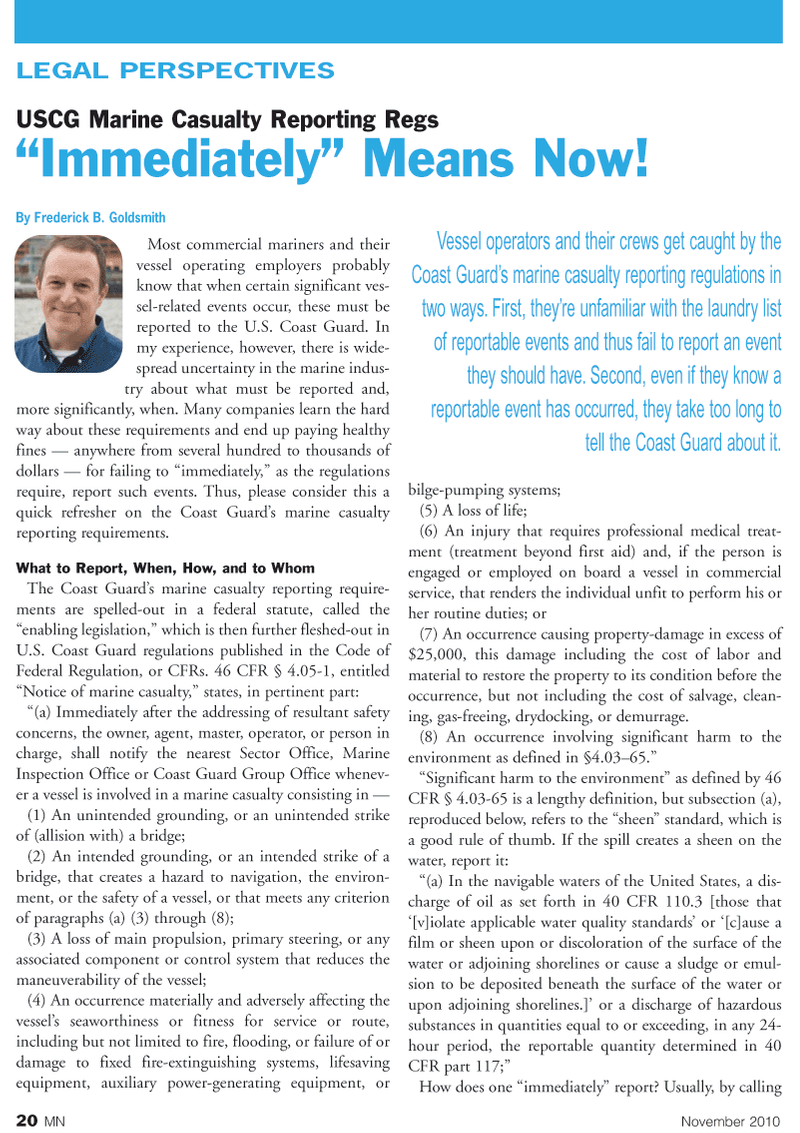
Page 20: of Marine News Magazine (November 2010)
Workboat Annual
Read this page in Pdf, Flash or Html5 edition of November 2010 Marine News Magazine
20 MN November 2010
LEGAL PERSPECTIVES
Most commercial mariners and their vessel operating employers probably know that when certain significant ves- sel-related events occur, these must be reported to the U.S. Coast Guard. In my experience, however, there is wide- spread uncertainty in the marine indus- try about what must be reported and, more significantly, when. Many companies learn the hard way about these requirements and end up paying healthy fines — anywhere from several hundred to thousands of dollars — for failing to “immediately,” as the regulations require, report such events. Thus, please consider this a quick refresher on the Coast Guard’s marine casualty reporting requirements.
What to Report, When, How, and to Whom
The Coast Guard’s marine casualty reporting require- ments are spelled-out in a federal statute, called the “enabling legislation,” which is then further fleshed-out in
U.S. Coast Guard regulations published in the Code of
Federal Regulation, or CFRs. 46 CFR § 4.05-1, entitled “Notice of marine casualty,” states, in pertinent part: “(a) Immediately after the addressing of resultant safety concerns, the owner, agent, master, operator, or person in charge, shall notify the nearest Sector Office, Marine
Inspection Office or Coast Guard Group Office whenev- er a vessel is involved in a marine casualty consisting in — (1) An unintended grounding, or an unintended strike of (allision with) a bridge; (2) An intended grounding, or an intended strike of a bridge, that creates a hazard to navigation, the environ- ment, or the safety of a vessel, or that meets any criterion of paragraphs (a) (3) through (8); (3) A loss of main propulsion, primary steering, or any associated component or control system that reduces the maneuverability of the vessel; (4) An occurrence materially and adversely affecting the vessel’s seaworthiness or fitness for service or route, including but not limited to fire, flooding, or failure of or damage to fixed fire-extinguishing systems, lifesaving equipment, auxiliary power-generating equipment, or bilge-pumping systems; (5) A loss of life; (6) An injury that requires professional medical treat- ment (treatment beyond first aid) and, if the person is engaged or employed on board a vessel in commercial service, that renders the individual unfit to perform his or her routine duties; or (7) An occurrence causing property-damage in excess of $25,000, this damage including the cost of labor and material to restore the property to its condition before the occurrence, but not including the cost of salvage, clean- ing, gas-freeing, drydocking, or demurrage. (8) An occurrence involving significant harm to the environment as defined in §4.03–65.” “Significant harm to the environment” as defined by 46
CFR § 4.03-65 is a lengthy definition, but subsection (a), reproduced below, refers to the “sheen” standard, which is a good rule of thumb. If the spill creates a sheen on the water, report it: “(a) In the navigable waters of the United States, a dis- charge of oil as set forth in 40 CFR 110.3 [those that ‘[v]iolate applicable water quality standards’ or ‘[c]ause a film or sheen upon or discoloration of the surface of the water or adjoining shorelines or cause a sludge or emul- sion to be deposited beneath the surface of the water or upon adjoining shorelines.]’ or a discharge of hazardous substances in quantities equal to or exceeding, in any 24- hour period, the reportable quantity determined in 40
CFR part 117;”
How does one “immediately” report? Usually, by calling
Vessel operators and their crews get caught by the
Coast Guard’s marine casualty reporting regulations in two ways. First, they’re unfamiliar with the laundry list of reportable events and thus fail to report an event they should have. Second, even if they know a reportable event has occurred, they take too long to tell the Coast Guard about it.
USCG Marine Casualty Reporting Regs “Immediately” Means Now!
By Frederick B. Goldsmith

 19
19

 21
21
